
CRYSTENGCOMM
metrics 2024
Unveiling the science of crystals for a transformative tomorrow.
Introduction
CRYSTENGCOMM is a distinguished journal published by the Royal Society of Chemistry, dedicated to advancing the field of crystallization and crystal engineering. With its impact factor consistently among the top tier in its category, CRYSTENGCOMM serves as an essential platform for researchers, professionals, and students in Chemistry, Condensed Matter Physics, and Materials Science. The journal has successfully maintained its relevance and influence since its inception, showcasing pioneering research from 1999 to 2024, with a commendable Q2 ranking in the latest evaluations. This accessibility to crucial developments in crystallization facilitates knowledge transfer across disciplines and enhances collaboration within the scientific community. Although it operates under a subscription model, the journal remains committed to disseminating cutting-edge research and fostering innovation in the field. For more information or to submit your research, please visit the Royal Society of Chemistry's website.
Metrics 2024
 -
- 2.60
2.60 2.60
2.60 -
-Metrics History
Rank 2024
IF (Web Of Science)
JCI (Web Of Science)
Quartile History
Similar Journals

RUSSIAN JOURNAL OF INORGANIC CHEMISTRY
Exploring the Depths of Inorganic ChemistryThe Russian Journal of Inorganic Chemistry is a distinguished publication that delves into the fundamental and applied aspects of inorganic chemistry. Published by MAIK Nauka/Interperiodica/Springer, this journal has established itself as a vital resource for researchers, professionals, and students alike, contributing significantly to the fields of Inorganic Chemistry, Materials Science, and Physical and Theoretical Chemistry. With an ISSN of 0036-0236 and an E-ISSN of 1531-8613, the journal is indexed for easy access and citation. Though the journal currently operates under a subscription model, its commitment to disseminating high-quality research and fostering scientific discourse remains steadfast. The journal has been maintaining a consistent record since its inception, and its positioning in the Q3 quartile across various chemistry categories in 2023 underscores its relevance in the academic community. As it continues through its converged years from 1996 to 2024, the Russian Journal of Inorganic Chemistry plays a pivotal role in enhancing the understanding and advancement of inorganic chemistry, making it an indispensable tool for anyone engaged in this dynamic field.
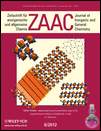
ZEITSCHRIFT FUR ANORGANISCHE UND ALLGEMEINE CHEMIE
Connecting Past Discoveries with Future InnovationsZEITSCHRIFT FUR ANORGANISCHE UND ALLGEMEINE CHEMIE, published by WILEY-V C H VERLAG GMBH, is a pivotal journal in the field of inorganic chemistry, catering to the needs of researchers, professionals, and students seeking to advance their understanding of this dynamic discipline. With its historical roots dating back to 1892 and a commitment to high-quality research, this journal provides a platform for the dissemination of significant findings related to inorganic substances and their general chemistry. Although currently not an open-access journal, it holds a competitive position with an impact factor placing it in the Q3 quartile of the Inorganic Chemistry category, ranking #57 out of 79 in Scopus. Situated in Germany, this journal not only connects past and present research endeavors but also aims to foster innovation and collaboration within the inorganic chemistry community. Whether you are exploring fundamental concepts or groundbreaking applications, ZEITSCHRIFT FUR ANORGANISCHE UND ALLGEMEINE CHEMIE remains an invaluable resource for advancing chemical sciences.
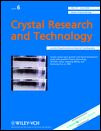
CRYSTAL RESEARCH AND TECHNOLOGY
Exploring Innovations in Crystal ScienceCRYSTAL RESEARCH AND TECHNOLOGY, published by WILEY-V C H VERLAG GMBH, is a distinguished journal in the fields of Chemistry, Condensed Matter Physics, and Materials Science, with over five decades of continuous publication from 1966 to 2024. With its ISSN 0232-1300 and E-ISSN 1521-4079, the journal serves as a crucial platform for disseminating significant research findings, theoretical advances, and technological innovations related to crystal growth, structure, and properties. Holding a Category Quartile ranking of Q3 in the 2023 assessments across its disciplines, CRYSTAL RESEARCH AND TECHNOLOGY is recognized for its contribution to the scientific community, making it an essential resource for researchers, professionals, and students alike. While this journal is not open access, its robust publishing framework ensures that high-quality peer-reviewed articles remain accessible to a global audience. The importance of this journal lies in its commitment to advancing knowledge and fostering collaborations in crystallography and related fields.

CHINESE JOURNAL OF STRUCTURAL CHEMISTRY
Fostering Collaboration in Structural ChemistryThe CHINESE JOURNAL OF STRUCTURAL CHEMISTRY, published by Elsevier, stands as a vital resource in the field of structural chemistry, notably contributing to the advancement of knowledge since its inception in 1996. With its ISSN 0254-5861 and E-ISSN 0254-5861, the journal has established a firm reputation, garnering a Q2 ranking in the 2023 Chemistry (miscellaneous) category, which highlights its influence in the academic community (rank #155/408, 62nd percentile in Scopus). This journal serves as an invaluable platform for researchers and professionals by disseminating high-quality research findings, theoretical studies, and applied methodologies that address both fundamental aspects and emerging trends in structural chemistry. With contributions from distinguished scholars, it aims to foster innovation and collaboration, while providing a space for novel discoveries in the field. Although it does not currently offer Open Access, its robust content continues to attract a diverse readership eager to engage with cutting-edge scientific developments.
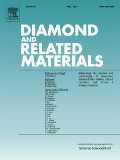
DIAMOND AND RELATED MATERIALS
Exploring the brilliance of diamond research.DIAMOND AND RELATED MATERIALS, published by Elsevier Science SA, serves as a premier international platform for the dissemination of high-quality research in the fields of materials science, electrical engineering, and chemistry, with a specialized focus on diamond and its related materials. With an ISSN of 0925-9635 and an E-ISSN of 1879-0062, this journal has established itself within the top quartiles, reflecting its influential contribution to the scientific community, particularly in the categories of Chemistry (miscellaneous) and Electrical Engineering, among others. The journal's wide scope encompasses both theoretical and applied aspects of diamond research, making it an essential resource for professionals and academics alike. The current rankings position it favorably within its respective disciplines, with a notable 79th percentile in General Physics and Astronomy and strong standings in related categories. Although it does not offer open access, researchers can stay informed of cutting-edge advancements and methodologies through its comprehensive articles and reviews, enriching the wider discourse in advanced materials research.
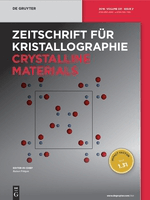
Zeitschrift fur Kristallographie-Crystalline Materials
Fostering Collaboration in the Realm of CrystallographyZeitschrift für Kristallographie-Crystalline Materials is a prestigious academic journal published by Walter de Gruyter GmbH, focusing on the intricate field of crystallography and its applications within condensed matter physics, inorganic chemistry, and materials science. Established in Germany, this journal spans a rich history from its inception in 1930 to its convergence years from 2012 to 2024, presenting cutting-edge research and developments in crystalline materials. With an impact factor reflective of its critical role within its field—ranking Q3 in the prestigious quartiles for 2023 across multiple categories—this journal serves as an essential platform for researchers, professionals, and students seeking to expand their knowledge and contribute to the advancement of crystalline materials. While currently not offering open access, the journal remains committed to disseminating high-quality, peer-reviewed articles that inspire innovation and collaboration within the scientific community.

JOURNAL OF ELECTRONIC MATERIALS
Elevating Knowledge in Condensed Matter Physics and BeyondWelcome to the Journal of Electronic Materials, a premier publication in the field of materials science. Published by Springer, this esteemed journal has been a beacon for groundbreaking research in electronic, optical, and magnetic materials since its inception in 1972. As an established resource, it boasts a commendable impact factor and categorically ranks in the second quartile (Q2) in key areas such as Condensed Matter Physics and Electrical and Electronic Engineering, as well as holding a respectable third quartile ranking in fields related to Electronic, Optical, and Magnetic Materials and Materials Chemistry. Researchers, professionals, and students can access a wealth of knowledge as we publish original articles, reviews, and cutting-edge research that push the boundaries of science and technology in these critical fields. Stay informed and engaged as we explore advancements that shape the future of electronic materials.
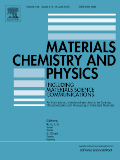
MATERIALS CHEMISTRY AND PHYSICS
Advancing Knowledge in Materials Chemistry and PhysicsMATERIALS CHEMISTRY AND PHYSICS is a leading peer-reviewed journal published by Elsevier Science SA, focusing on the intersection of materials science and condensed matter physics. With an esteemed impact factor and a distinguished reputation in its field, this journal holds a Q1 ranking in Condensed Matter Physics and a Q2 ranking in miscellaneous Materials Science categories as of 2023. Spanning over three decades since its inception in 1983, it provides a vital platform for researchers, professionals, and students to disseminate cutting-edge findings and innovations in materials characterization, properties, and applications. The journal is indexed in Scopus, boasting impressive rankings that reflect its commitment to publishing high-quality research. Although it does not currently offer an Open Access option, it remains an essential resource for those seeking to stay at the forefront of materials chemistry and physics.

Nanoscale Research Letters
Bridging science and application at the nanoscale.Nanoscale Research Letters, published by SPRINGER, is a leading open-access journal dedicated to the rapid dissemination of innovative research in the field of nanoscience and nanotechnology. Established in 2006, this journal provides researchers and professionals with a platform to share their groundbreaking findings across a broad spectrum of applications, including condensed matter physics and materials science. With an impressive Q1 ranking in both Condensed Matter Physics and Materials Science categories as of 2023, it asserts its position as a top-tier publication within the scientific community, bolstered by a 96th percentile rank in the Scopus database. Nanoscale Research Letters not only emphasizes the importance of nanotechnology research but also ensures that its findings are widely accessible, adhering to its open-access mandate. Scholars and students alike are encouraged to contribute to and engage with this dynamic resource, fostering collaboration and innovation in the ever-evolving world of nanoscience.
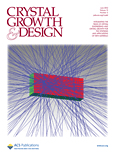
CRYSTAL GROWTH & DESIGN
Exploring the Frontiers of Crystal ScienceCRYSTAL GROWTH & DESIGN, published by the American Chemical Society, is a premier journal dedicated to the interdisciplinary study of materials science, condensed matter physics, and miscellaneous chemistry. With an ISSN of 1528-7483 and E-ISSN of 1528-7505, this journal provides a vital platform for the dissemination of innovative research findings from 2001 through 2024, reflecting the dynamic advancements in crystal growth and design methodologies. It is recognized for its impact in the field, earning a distinguished placement in the Q2 quartile across categories of Chemistry, Condensed Matter Physics, and Materials Science for 2023. Researchers engaging with CRYSTAL GROWTH & DESIGN will find a wealth of peer-reviewed articles encompassing cutting-edge experimental techniques, theoretical frameworks, and application-oriented studies. Although not an open-access journal, it remains a critical resource for academics, professionals, and students aiming to enhance their understanding of crystal growth processes and material functionality, with Scopus rankings reflecting its reputable authority within the scientific community.